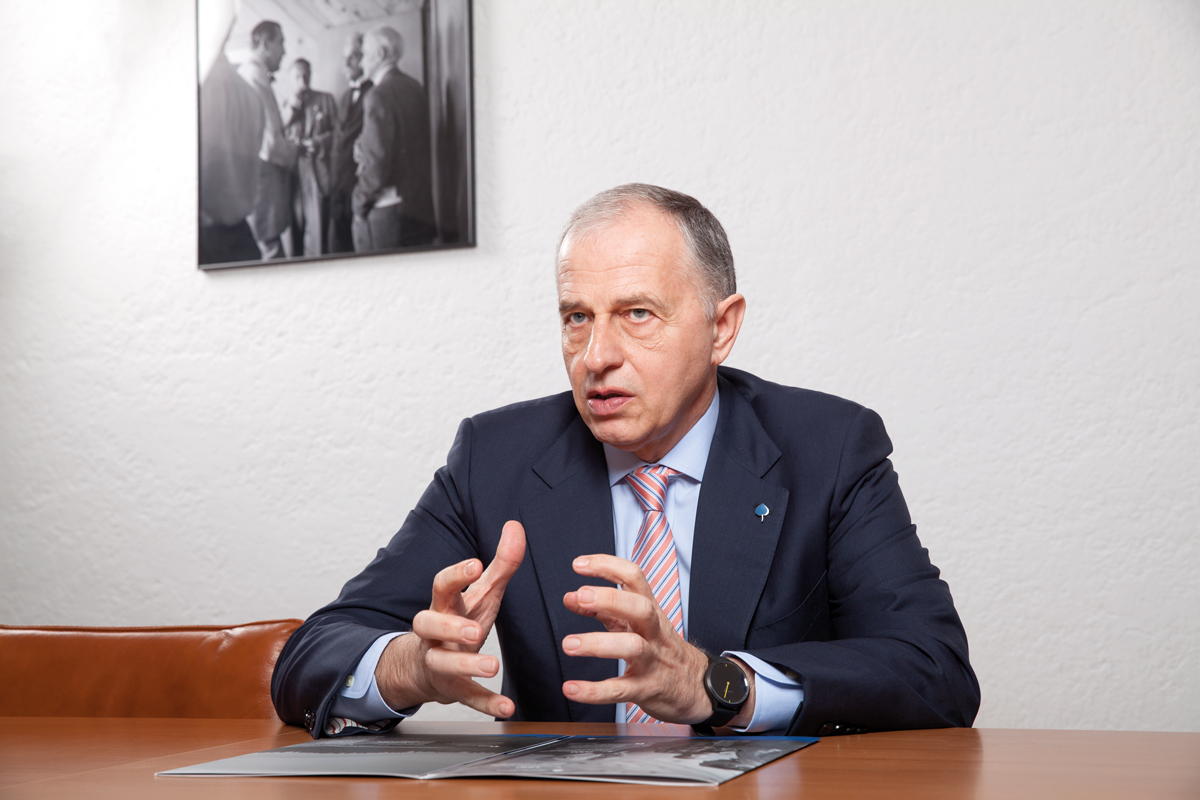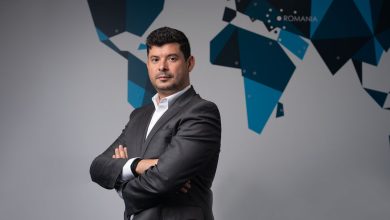Mircea Geoana shares his views on Romania’s role in the Black Sea Region
Romania has recently been to the forefront of the European energy scene, through meetings of particular regional importance that took place in Bucharest.
About Romania’s role in enhancing energy security and stability in the region, opportunities, challenges and vulnerabilities in the Black Sea area as well as the Davos Forum messages we have extensively discussed with Mircea Geoana, Founder and President of the Aspen Institute Romania.
Short CV
Mircea Geoana is the founder and president of the Aspen Institute Romania and a prominent international public figure. He serves on the boards of trustees of the Aspen Institute US, Aspen Germany and Aspen Italia. He is also Co-chair of Aspen European Strategy Group.
Mircea Geoana ran for the Presidency of Romania in 2009. In an unprecedented narrow and contested election, he received 49.6% of the casted ballot.
He served as the President of the Romanian Senate between December 2008 and November 2011 and President of the Social Democratic Party, from 2005 to 2010.
Between 2012 and 2014, he served as Chairman of the Joint Committee of the Romanian Senate and Chamber of Deputies regarding Romania’s Accession to the Schengen Area, and as High Representative of the Romanian Government for Strategic Economic Projects and Public Diplomacy. Between 2008 and 2012 he also served as chairman of the Foreign Policy Committee of the Romanian Senate.
Previous to his political career, Mircea Geoana had a successful diplomatic activity. Appointed Ambassador Extraordinary and Plenipotentiary of Romania to the United States of America at age 37, in February 1996, he was the youngest ambassador in the Romanian diplomatic corps. From 2000 to 2004, Mircea Geoana served as Minister of Foreign Affairs of Romania. He also served as OSCE Chairman-in-Office in 2001 and during 2005 he was the personal representative of OSCE Chairman in office for Georgia.
Mircea Geoana is a founding member of the Harvard Club Romania – Republic of Moldova and of the Association of Former Students of E.N.A. (Ecole Nationale d’Administration). He also serves as Honorary Chairman of the George C. Marshall Association – Romania. He is the Chairman of the National Development Committee think-tank and the Romania Noastra civic platform.
An alumnus of the Polytechnic Institute and, respectively, the Law School at the University of Bucharest, Mircea Geoana graduated in 1992 the ‘Ecole Nationale d’Administration’ in Paris, France. He graduated in 1999 the World Bank Group Executive Development Program at the Harvard Business School. He holds a PhD in world economy at the Economic Studies Academy of Bucharest.
Mircea Geoana is an expert on European and Trans-Atlantic integration. He also was a NATO fellow on democratic institutions in 1994. He lectured on foreign policy, transitional economies, and globalization at major universities and think – tanks: Sorbonne, Harvard, Georgetown, Yale, CUNY, University of Pittsburgh, CSIS, Atlantic Council, GMF, Chatham House, Policy Network, Friedrich Ebert Stiftung and is a contributor to important Romanian and international publications, like the New York Times, International Herald Tribune, The Atlantic, Frankfurter Allgemeine Zeitung. Also, he has been invited on foreign policy issues at CNN, BBC, PBS, Bloomberg, TV5, Fox Business, ZDF. He served as visiting professor and developed Leadership graduate and executive education courses at the Polytechnic University and the Academy for Economic Studies in Bucharest.
Mircea Geoana is author of several books: ‘Romanian foreign policy in the beginning of the XXIth century – The road to Europe and transatlantic world’, ‘America, Europe and Romania’s modernization: bases for a Romanian societal model’, ‘The Romanian social model: the way towards a new Romania’, ‘Trust’.
Mircea Geoana was decorated Commander of the National Order ‘The Star of Romania’ in December 2000, awarded the ‘Legion d’Honneur’ in 2002 (France) and ‘Stella della Solidarieta’ in 2013 (Italy).
Dear Mr. Mircea Geoana, please tell us a few words about the Aspen Institute, its method, main objectives and projects.
Mircea Geoana: The Aspen Institute was originally created in 1949, in Colorado, in the small mining city with the name of Aspen. It started with the idea to try avoiding the horrors of the Second World War.
This is why the Aspen Institutes world-wide have embraced the mission of investing in a value-based leadership, and also in a debating, rational and a multi partisan way to find a solution to the critical issues facing the human society. Aspen was created in Romania 11 years ago as a part of Aspen’s global network.
We have 7 Aspen Institutes in Europe. Together with Aspen Germany we are the co-leaders of the Aspen Europe Strategy Group.
There are also Aspens in Japan, India and Mexico, we will open new ones in New Zealand, possibly in Colombia.
So, this is a global organization. We are running independently, we have our own governance.
We are 100 percent privately funded and we are trying to stay true to our mission of encouraging value-based leadership and an educated conversation om the critical topics impacting our society.
We have invested in hundreds of young leaders and more mature leaders throughout our leadership programs. We have a network of fellows and alumni of our organization from 22 different countries. So, it’s not only Romania, it’s also the region.
We have developed policy programs, in which energy is already a mature program – the Aspen Energy and Sustainability Program – an Aspen Energy Lab, which is, I’d say, a little bit more narrowly focused on various topics.
We have policy programs on governance, on technology, on healthcare, on the future of work, speaking of the fourth industrial revolution, on sports, arts and society.
So, we’re trying to cover, as our mission indicates, the critical issues faced by our society. And, also, we are probably one of the most important public platforms.
Our project, Bucharest Forum, is the largest conference organized in Romania.
We organize other International conferences on security, in partnership with NATO, an Aspen Energy Summit in Ploiesti every year, and we are very happy to have the cooperation and partnership of your magazine on such endeavour.
We also produce impactful healthcare, technology and the future of work forums.
Basically, our work relies on this three-layer approach based on leadership, public events and policy programs.
The Aspen Method consists in bringing around at the same table the three dimensions of any society, namely the public sector, the decision makers, and the private sector, and of course the non-governmental and academic sectors.
Sometimes, in countries like Romania with a weak tradition of governance, there is a sort of a culture of ‘working in Silos’. But most of the time there is a conversation about policy solutions that they are not conducting together.
They just meet at the end of the process. So, when the government already has a draft strategy, let’s say on energy, they have had some consultations with the others, but they’re not very serious or very conclusive.
And I think we’ve done some progress in proposing public policy recommendations.
They are easier to be digested by the public sector if they contribute to the process until the outcome, rather than being served a very smart and nicely coloured brochure.
In a nutshell, we try to go to the next level, we start new leadership programs. We start a Nicolae Iorga public service fellowship for young politicians and young civil servants, including from the regulatory agencies, ANCOM, ANRE, the Competition Council, the Court of Auditors.
These are institutions that sometimes are more important for the private sector than the Government itself or the Parliament itself, which are also very important. As technology is growing, we are trying to invest in higher quality, we are starting a new program called the Aspen Leadership and Technology Academy (ALTA).
This is the first program where we also cooperate with universities from abroad and restart something on public sector and also on technology.
We also have programs for students. We’ve tried to go into high schools, because today you have to start putting the right seed very early in their lives.
So, we hope to continue to be a relevant voice.
We are encouraging the partnerships. We have partnerships with the main universities in Romania, including UPG in Ploiesti, ASE, Politehnica, SNSPA or Babes-Bolyai University.
So, we recognize the need for intellectual content. We have partnerships with a number of public institutions like the Government of Romania, the Foreign Ministry, the Ministry of Defence on our conferences.
And we also have something more specialized, called City Labs – a combination of an urban regeneration and smart cities with the city of Bucharest and with the city of Constanta for the time being.
We also try to be helpful to the Romanian Presidency of the Council of the European Union, mainly on the strategic and foreign policy front when it comes to the Black Sea and what we would call the Gdansk – Constanta corridor, etc.
In your opinion, how should Romania act to capitalize on its favourable position on the regional geopolitical map?
Mircea Geoana: I strongly believe, from my professional experience, that consolidating the Eastern flank of NATO and the EU is important. Romania should play this role, a simultaneous role as a fortress but also as a gateway because I think Romania shouldn’t be only a fortress of the West in this region, as there are forces coming from the East as well, not only Russia, but also China, the Caucasus, Central Asia, Turkey, also the Greater Middle East and Romania should benefit from the Gulf.
These are very dynamic regions that Romania should capitalize on, but of course being true and loyal to our alliances with Europe too, to our partnership with America, to NATO.
So, in fact, this dual role of Romania as a fortress and gateway, I think this is something that Aspen is very keen in contributing to and assisting the leaders of Romania in achieving Romanians’ national ambitions.
I think Romania has done a decent job in capitalizing on our, let’s say, strategic relevance.
To be honest, NATO and EU accession for Romania were mainly based on geopolitical and geostrategic reasons.
I think what Romania should do at this point in time is to start to also capitalize on the geo-economic and economic relevance, because no matter how strong military cooperation, security cooperation and intelligence cooperation are in Europe and the U.S., they will never be able to compensate the economic weakness and the lack of capitalization of our economy and the lack of sufficient technology transfer to our economy.
Thus, I believe we should continue to be strong at the military, defence, security and intelligence levels, because that’s something we need to do, helping NATO and helping Ukraine to fight cyber-crime or cyber-defence.
That’s great. Ministry of Defence is spending two percent of GDP for defence, that’s great. Having big American and European corporations investing in our defence, that’s absolutely great.
But I think the time has come for us to bring to the same level of relevance the economic potential and the technological potential, as well as the market potential of Romania.
How can this be done?
Mircea Geoana: I think first of all by identifying new projects.
Money comes and ideas come when there is a fertile soil.
So, there are lots of private equity firms that are looking for financing projects. Speaking of corporations, let’s say with the Chinese, we’ve been proposing the same projects over and over again without any sophistication and getting some fresh money.
We always complain that the strategic partnership with the US, which is very strong in defence, is very weak in terms of economic issues. And people in Bucharest, Cluj, Timisoara, Constanta or Iasi are expecting the White House or Trump, or even Obama before, to give an order – to let’s say Exxon or Halliburton – to come. No, they come if they have a business interest.
So, I think strengthening the business case is important.
The other issue, which I consider to be the number one liability of Romania, is the poor reputation that we have in Europe. Romania has a bad image.
Even if the country is attractive, even if there is a room to do more business, if there is room for using Romania as a platform at the regional level or as a gateway between East and West, the moment when there is zero investment in what we call the brand of Romania, we should start a national effort, at the level of public and private sectors again, and NGOs and universities to reposition Romania.
Why is Romania still the country where most of the news is on the negative side?
Why is Estonia, a tiny country, able to be presented as the beacon of digitalization? Romania has today hundreds of R&D centres across its territory.
How many people know that the latest Amazon tool, the artificial intelligence, were produced by Romanian engineers?
How many people know that the latest Fitbit watch of Apple was produced by a Romanian Vector company?
How many people know that Amazon is renting now six floors of offices in Bucharest?
How many people know that Deloitte is creating artificial intelligence in Romania? How many people know that Bosch has moved its R&D centre to Romania?
These are just a few examples.
So, Romania is a country of technology, of IT, of engineering and research and development, investing in the laser in Magurele (southern Bucharest), expanding what happens in Cluj and Iasi and so on.
Thus, in my opinion these are the major components: stay strong on defence, stay strong on security, open up the economy, invest more in the economy, ‘groom’ national economic champions.
We have some examples of companies in Romania today. Look at CEZ, MOL, Hidroelectrica, Electrica, Transgaz or Romgaz.
Why are the other governments able to have national champions that are competing with the big players abroad, not against, but competing?
I think this is something that the new government has to think hard about because I do not believe that this anti big corporation rhetoric is leading anywhere, but economic patriotism is.
This is something that every nation does. So, we still have huge assets in the Romanian state control.
I think we have to make sure that there is also private investment into these because it means more transparency, more capital, and more accountability.
We have to be exceptionally careful in making sure that the new Sovereign Fund of Romania, that will take assets from these very companies, will become a tool that will help Romania’s economic strength and not debilitate further these crown jewels that I mentioned before.
So, these are very important strategic economic decisions that the government has to make.
And I hope that it will be listening to the ones who are really interested in developing strong Romanian champions with regional coverage, able to finally start becoming an economic player in the Republic of Moldova.
Of course, there is BCR there, there is Petrom, but there is no large Romanian owned company over there. And also, the last point I would like to make, I think we have to find real policy with practical solutions to help the Romanian private sector.
There are a lot of SME plus companies, I see them dealing with EBRD, even with EIB, trying to get a private equity, to get some funding.
There are probably hundreds and hundreds of Romanian companies and Romanian entrepreneurs, including in the energy sector, including in R&D, and I think that if we find a smarter policy to assist them through market rules, because we cannot go outside of the anti-trust and state aid policy, I think we could have, in the next three to five years, with big players like Exxon, Halliburton or others, help for the rest of the local ecosystem to grow to the next level.
I didn’t mention Conpet, which is another great company that has potential and I think with a little bit of sophistication on behalf of the government or the Ministry of Energy we could really reach the level of Poland or the Czech Republic or Hungary, the top regional players, in economic terms, not only in geopolitical and strategic terms.
We have to start being more realistic and also be able to execute strategies because the potential is here, everybody speaks and brags about potential. But then I still don’t see an action plan with steps, with money in line with the strategy.
I think this is a wake-up call. I think all these famous strategies that we have in almost every sector – some people are saying that we have the country with the largest number of strategies per capita – is a politicized game.
There is a complicated conversation about the National Energy Strategy. There’s a new government coming and changing things and I think we should try to start acting and doing something, as I mentioned. Some things are happening but I still don’t see a sort of integrated vision about this act in Romania.
We hope the new government will have now more time to work – we had five economy ministers and three energy ministers changed in one year, that’s too much, they cannot focus.
We have to keep working with them and again, the Aspen method, as I mentioned, having the public, the private and non-governmental sectors working together could be one of the solutions.
It would be a pity to continue complaining for other 20 years that Romania used to have such a potential and we’ve missed it. This will be a great, great and severe failure on behalf of all of us.
This is not only the failure of the government, is a failure of all of us having such a gold nugget on our hands and being unable to have the sophistication to put it to work.
According to the Ministry of Foreign Affairs, the Black Sea region will be a major theme on the list of Romania’s priorities in the context of supporting the presidency for the EU Council in 2019. What opportunities, challenges and vulnerabilities do you see regarding the exploitation of hydrocarbon resources in the Romanian Black Sea sector (from a political, economic and other points of view)?
Mircea Geoana: I think exploration and exploitation in the Black Sea, now with the oil price moving up and also with the right kind of policy and regulation and the fiscal policy for this specific issue, will go forward, this is my instinct. I’ve also seen recently Exxon offering a big public tender for some operations.
They also brought, all the way from Egypt, this state-of-the-art drilling operation. They have also developed new technology to work in the very sulphurous waters of the Black Sea.
If a giant like this one is starting in Romania, I think that they have projects around the Black Sea, possibly in Ukraine, although there is a difficult situation because of the Crimea annexation by Russia.
We’ll see how things develop in the offshore area – OMV Petrom will go forward and also Carlyle Group will go forward. This is a game changer for Romania and also for the Black Sea.
What will happen with this natural gas? Of course, this is another conversation about the pipeline system about how much do we export, about how much is used domestically.
But having said that, I still believe that the Black Sea would be an area of confrontation and geopolitical rivalry, we see this rapprochement between Turkey and Russia…
It’s clear that everybody will be expecting the new German government to come in and see what will happen with Nord Stream 2, because we cannot look only at the Black Sea without taking a look at the broader context.
We have to see if the LNG from Louisiana and the Gulf of Mexico, the U.S. natural gas reaches the Baltic shores and Poland. And speaking of Gdansk-Constanta corridor, we also have to see how these new sanctions that US has imposed on Russian oligarchs and Russian companies will continue, we’ll see lots of other issues.
I will not rule out the possibility for a certain balance to be reached in the Black Sea region.
But I think we have to be ready for a continuous rivalry with Russia in the Black Sea.
And I will also add the point that for Romania what will happen in Ukraine is also very important, also in Turkey, in Georgia.
For Romania the Black Sea is vital. So, again, the art for Romania would be to be able to combine the fortress and gateway concepts, to be strong and vigilant when it comes through aggression and security risks, many from Russia, but also to be able to create a context to be a gateway, not only East-West, but also North-South.
This is why I welcome the fact that European Commission is starting to fund the Dobrogea connection to Bulgaria, from Issacea to Burgas, the interconnectors of all sorts. I’m welcoming the fact that the European Commission is funding also the compressor stations.
So, I think we must play our game in a more coherent way, using the fact that we are the only quasi-independent country in the region in terms of energy, and be good with our neighbours… We have cards to play and I think we have to continue to play the European card.
The Energy Union will also be good for us. The Energy Union also means that the Western European companies will not strike separate deals with Russia and Gazprom behind our back.
So, I’m cautiously optimistic that Romania will be able to play all of these cards, as well as each of us who has something to add, a small platform like Aspen or much bigger players like the government or municipalities.
The World Economic Forum in Davos brought together this year, as always, important leaders and politicians around the world. What were in your opinion the most important messages of speeches and debates? How do you explain the absence of our country at this event?
Mircea Geoana: We can pay attention to two messages of the Davos Forum. The first is that the world is in full swing – politically multipolar, economically multilateral and with an industrial revolution that will resettle everything, politics including.
The second concerns the risk of resting on our laurels.
We are approaching the end of the growth cycle of the global economy, so we would better pay attention to what’s next, be prepared for what follows.
In the past 10-15 years there have been some Romanian businessmen attending the Davos Forum, but in the past 15 years I don’t remember seeing politicians from Romania there, although their counterparts from other countries participate.
For example, this year Poland is represented at both Prime Minister and President levels.
Romania seems to lack the appetite for the conversations that are polishing its future.
Our leaders are often reluctant to go there, because, probably, they are not prepared to support theses and ideas. It’s a provincial complex.
Then, when you change 10 Foreign Ministers in two years, and you change prime ministers as you change the subway, so when people do not know how long they will remain in office, who has the time for forums like Davos?
As you recalled, we are going through a period of intense transformation, in which the industrial revolution plays a key role. The watchwords are internationalization, digitalization, innovation, cyber security… How do you see the future?
Mircea Geoana: The truth is that the energy sector is changing dramatically.
I’ve seen a contract signed by a Hungarian company and a Finnish company for creating a network for electric cars all over Hungary. That’s something that is coming. Digitalization is something that will have an impact.
Renewables are something that we have to look into.
The famous energy mix will be changed and the business models will also be changed.
So, I think we have to play our cards as they are today, but also to anticipate the future and prepare for the future.
The future will be disruptive. This is something that all of us should start preparing for.
What are the plans of the Aspen Institute Romania for 2018 and the next period?
Mircea Geoana: We have spin in energy because this a primary sector. I was struck going to Ploiesti for the Aspen Energy Summit last fall. And we had this great participation, such as Commissioner Šefčovič, the American Ambassador, we had ministers, Government officials, we had the private sector, the State Department and Department of Defense from Washington also attending the conference.
But looking to the presence of the American companies around Ploiesti, I’ve seen there also Schlumberger, Honeywell, Halliburton… Now with the price of oil going up, probably, hopefully, Exxon, OMV Petrom and the others will start exploiting natural gas in the Black Sea.
And speaking of Houston, because all these American companies – Exxon, Halliburton and Schlumberger-Cameron, Honeywell, have their headquarters in Houston, Texas (the capital of energy worldwide), most of these companies have a presence in Romania, in Ploiesti and in Constanta.
In Houston, they’ve started an energy corridor, which is basically a physical space involving companies that are dealing with energy, also suppliers of the big companies, or R&D, services or equipment companies, or universities, traders, technology companies that are influencing and contributing to this industry. Why not try to emulate and create an energy corridor, between these three cities – Houston, Ploiesti and Constanta?
I was thinking even, and this is something we are trying to do and convince the Americans and also our local leaders, why not have a triple twinning between Houston, Ploiesti and Constanta and thus create a triangle that could be useful?
The same thing should be applied for European energy players because this is not just an American thing exclusively.
There are also OMV Petrom and other European companies that are important, like Enel, or E.ON, ENGIE.
What we are trying to do is come up with more creative ideas, because of course when it comes to implementing strategies for all these things, you need the public sector and the private sector, but we try to be a little more creative.
There is also something else that we would like to do for 2018. We also try to transform the conversation about the Energy Union and the preparation for the new financial perspective, the new budget of the EU for 2021-2028, as a more, let’s say, internalized discussion in Romania.
Because the problem that we will be facing (speaking of the poor absorption of EU funds that unfortunately is chronical in Romania and hopefully this will improve now) is that the money, European money for the next seven years up to 2021 will not be appropriated on the traditional way – cohesion funds and then structural funds. It will be closer to what Juncker plan represents today.
There will be appropriate projects, in a more competitive manner, the system will change. So, what we’re trying to do this year as the Commission will present a new draft budget for the next seven years is to prepare Romania and also prepare the private sector and the public sector in Romania to cope with this new logic.
There will be a new universe of EU funds organized differently – a new model.
The issue is that the negotiations between Berlin and Paris, the negotiations between the Eurozone countries, the negotiations between all 27 of us, we’ll probably, this is our hypothesis, make many changes, and in fact what we are trying to do is use energy, one of the few strategic, competitive and edge domains we have in the country.
There are not many – there is technology and IT, R&D, engineering and energy. So, I think energy has been underutilized in the attempt to put Romania on the map.
Of course, there are also geopolitical and geo-economic constraints, Russia, Turkey… But now with America becoming in 2018 probably the number one producer of oil in the world, outperforming Saudi Arabia and Russia, together with the fact that within energy security there will probably be a new conversation, I think Romania could finally start playing a significant role.
We have to end the isolation of infrastructures, including oil and energy, which Romania is facing today.
The fact that we have this connection with Hungary is not enough.
We have to do more, the one with Chisinau, the one with Bulgaria, the Southern Corridor, the BRUA project.
These are the things that I believe all of us, including the private sector, not only the public sector, and of course, NGOs like Aspen and specialized media like the Energy Industry Review, should join forces for.
I think all of us should try to steer in the same direction.
When do you think the energy corridor mentioned above can be started?
Mircea Geoana: I think it’s relatively easy to be started because in Europe there is a big, big, big chunk of money for industrial clusters. Horizon 2020 is another source of EU funds and any local administration, sometimes also with the national government, if there is a need, will start operating in the logic of having energy as one of the priorities for economic development. I think projects on EU funds can be written rapidly.
I also know that within the Juncker plan there is money from the European Investment Bank for such projects and I believe it also brings the non-EU players, like American companies and others, and we should be in the situation of moving forward. As you know, Rompetrol today is a consortium of Chinese and Kazakh investors and they are a player in Romania.
If everything goes well, we hope to have a high-level presence from Europe and America to the Ploiesti Energy Summit and then going back-to-back to Constanta and eventually starting to crystallize the concept.
I also count on the big consulting names, active in this field – the Big Four, A.T. Kearney, McKinsey – they are all members of the institute.
So, we also hope that when we need professional help, they will join this process, which is a win-win proposition for everybody.







